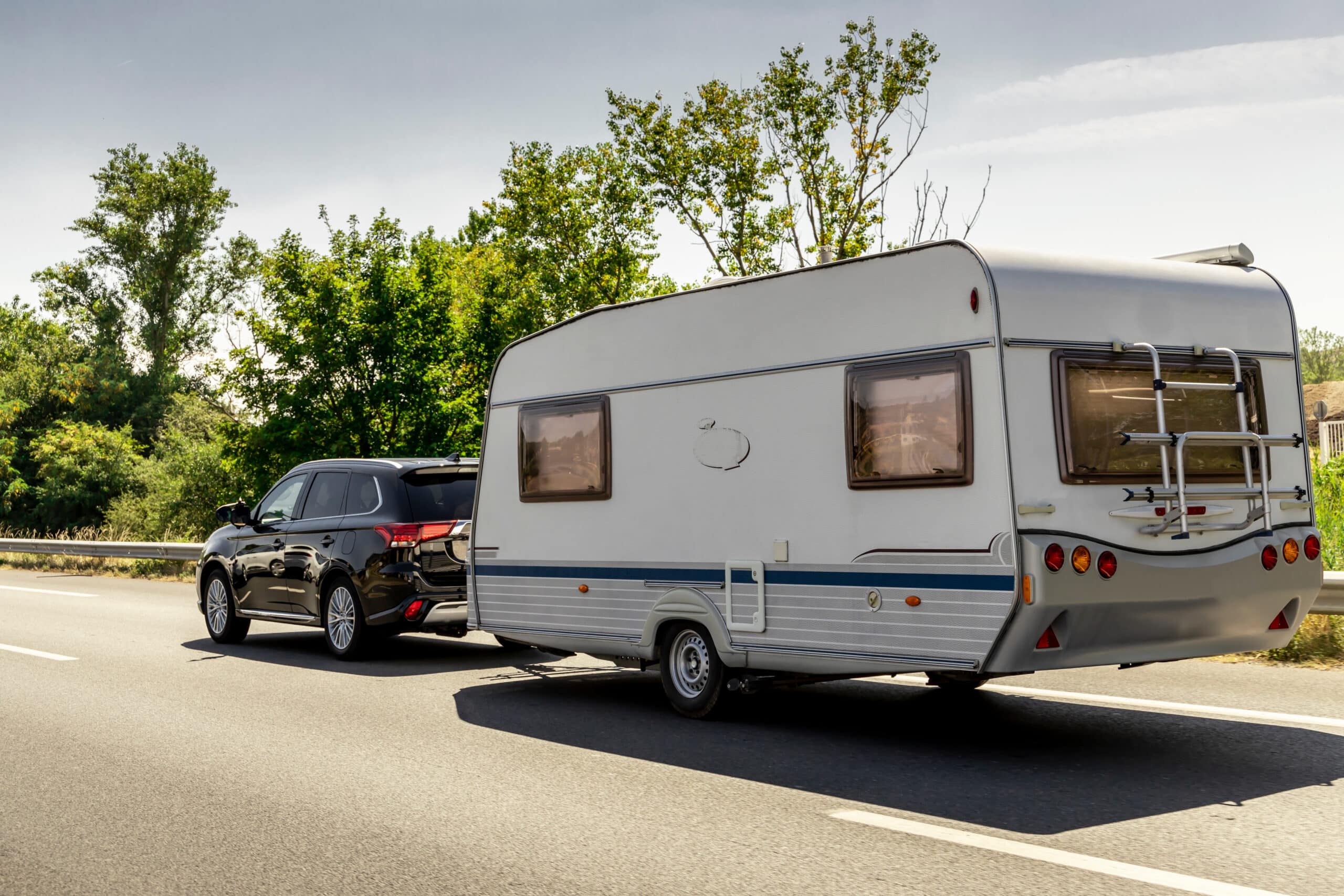5 Reasons Your Caravan Wobbles & How To Fix It
Some of the links below are affiliate links. As an Amazon Associate, I earn from qualifying purchases. This means that, at zero cost to you, I will earn an affiliate commission if you click through the link and finalize a purchase.
Hitching a caravan to your vehicle unlocks numerous possibilities, especially in terms of convenience and capacity expansion. However, issues such as wobbling can present safety issues, something that causes uneasiness among most caravan towers. So what are the main reasons why your caravan wobbles, and how can you fix them?
The main reasons for wobbling include improper weight distribution, incorrect tyre pressure or poor suspension, driving at high speeds, and strong side winds. You can reduce wobbling by installing weight distribution hitches or anti-sway bars, and maintaining proper tyre pressure, among others.
If your caravan is wobbling a lot, you may need to fix the issue in order to increase your safety. A bit of wobbling is often considered normal, but too much wobbling needs to be checked out. Evening out the load in your caravan and ensuring the weight is properly distributed is essential to keeping your caravan steady.
Additionally, very fast driving can often be a culprit for a wobbly caravan. This is not only extremely dangerous, but the overload of the caravan weight on your car or van could end in an accident. You could easily turn a corner too quickly and end up on your side. Always try to drive within the safe speed limits and pay close attention to how you rack up your caravan to your vehicle. Safety should always come first when driving.
This article will discuss helpful questions related to this topic, including the most common causes of wobbling, whether this is something you should expect, and some handy tips on stopping your caravan from wobbling. Most of these are pretty easy fixes (and some can be obvious as well), so you should be able to fix them on your own. If you own – or are planning on owning a caravan, I recommend reading on.
Should My Caravan Wobble?
Wobbling is a natural and expected phenomenon for most caravans, and no mechanism can completely minimize swaying. It’s just physics. The only difference is that it is less noticeable in some caravans when compared to others, and you can reduce it with the right interventions.
If you are experiencing issues with your caravan wobbling, take heart in knowing that you are not alone. A review of caravan towers all over the UK shows that there is almost always some wobble when you hitch a caravan to your car. The difference is the degree.
The operative phrase in this instance is ‘almost always.’ As the caravan experts at Practical Caravan explain, you can prevent swaying by driving sensibly and taking necessary precautions to mitigate swaying. However, appreciating the fact that wobbling may cause you to lose control, you will be well advised to air on the side of caution and prepare in advance.
This wobbling is caused by a wide variety of issues, the most common of which are poor packing and uneven weight distribution. These will be discussed in detail shortly in this article. The good news is that there are simple fixes that you can apply to keep this wobbling to a minimum, as will also be discussed shortly in this article.
5 Reasons Your Caravan Wobbles
There are numerous reasons why your caravan wobbles. Below are some of the most common causes.
Uneven Load Distribution
One of the most common causes of wobbling is uneven weight distribution as a result of improper loading techniques. As explained by the gurus at Allbrand Caravan Services, uneven weight distribution is the leading cause of wobbling.
According to the above source, this can take many forms. For instance, most towers make the mistake of overloading the car’s rear end, which causes swaying and wobbling.
This will also occur if you attach heavy accessories to the back or the front of the caravan.
If the weight on the caravan is not evenly spread out, there will be parts that will be under more strain relative to the others. This means that the tyres will be subjected to different levels of strain, resulting in wobbling.
Uneven Tyre Pressure
Uneven tyre pressure is another common reason your caravan may be wobbling. If you do not maintain correct tyre pressure when towing your caravan, it may result in instability due to the weight imbalance.
This will also occur when the tyre pressure is too high. Remember, your tyre will likely overheat during driving, which causes the air pressure within them to rise. This means that when the air pressure is too high, to begin with, the additional air pressure caused by the heat may result in swaying or imbalance.
On the same breadth, when the tyre pressure is too low, to begin with, they will wear unevenly during driving, which also results in an imbalance. Thus, both underinflation and overinflation can increase the risk of wobbling.
High Speeds
High speeds are notorious for causing swaying and wobbling in caravans. What is even worse is that attempting to slow your car too fast may cause an imbalance between your vehicle’s speed and caravan speed, which can be dangerous for you and others around you.
In most instances, the higher your speed, the more likely your caravan will sway or wobble.
Poor Suspensions
If your caravan is wobbling more than usual, then it is likely that this is due to poor suspensions. As explained by Torque, wobbling wheels are often caused by inflation issues or misaligned suspension.
Poor suspensions present a significant risk, especially due to the impact that they have on wheel alignment. To this end, the more misaligned the wheels are due to poor suspension, the more difficult it is to keep your caravan on course.
Side Winds
Your vehicle and caravan are subject to the elements. This means that changes in the weather, temperature, and winds will impact your vehicle’s stability. This issue becomes even more significant if you have to deal with strong winds.
In fact, the Caravan guard warns that even moderate winds can cause your caravan to rock from side to side, increasing the risk of tipping over. Strong winds are a threat even when your caravan is parked on a campsite. There are numerous cases where caravans topple over due to impact by strong side winds when parked.
5 Ways To Stop Your Caravan From Wobbling
The following are five handy interventions that you can take to stop your caravan from wobbling.
1. Weight Distribution Hitches
As previously discussed, one of the leading causes of caravan wobbling is uneven weight distribution. However, ensuring that the weight is evenly distributed on your caravan is often easier said than done, particularly on longer units.
This is where weight distribution hitches come in handy.
Weight distribution hitches link the tow vehicle and the caravan, improving towability and helping to share the load between the caravan itself and the vehicle. This is especially useful when you have a long caravan.
If unsure of where to start, the EAZ LIFT Elite Kit from Amazon.com is an excellent choice and has been tested and tried for durability and reliability.
2. Use Stabilizer Bars
Stabilizer bars are useful to protect your caravan against tipping over, especially due to winds. Some of the most common stabilizers are anti-sway bars. These can be mounted on the caravan hitch.
Because they extend from the trailer tongue to the brakes, they help stabilize the caravan if it begins to sway. It is, however, important to note that these stabilizers are most effective under normal conditions. According to AutoElecOZ, they are not as effective during strong winds.
It is therefore recommended to avoid using your caravan during strong winds, even when you have stabilizer bars installed.
Electronic Stability Control
Alternatively, you can fit your setup with electronic stability control. This is an automatic braking system that monitors dangerous side-to-side movements for your caravan. If the system determines that these movements are dangerous, it automatically controls the braking to keep these movements to a minimum.
3. Slow Down
Sometimes, the answer is as simple as slowing down. One of the downsides of driving at high speeds is that it causes instability, which makes control problematic. As a general rule of thumb, it is recommended that you stick to the speed limit when you have a caravan in tow.
If you discover that your caravan is towing uncontrollably due to high speeds, staying calm as much as possible is important. Fight the urge to reduce the speed too rapidly as this may cause greater instability. Instead, reduce your speed gradually, ensuring that the caravan slows down safely.
4. Proper Load Placement
You can avoid many issues related to wobbling by enhancing your load placement approach. An excellent place to start is to ensure that your place has the heaviest appliances or accessories closer to the axle and the floor. You can then place the lighter objects above the heavy appliances.
For some more guidance on this, spare some minutes and take a look at the video below:
5. Check your Tyre Pressure and Suspension
Prevention is better than cure. Accordingly, minimizing the risks associated with tyre or suspension-related wobbling begins with ensuring that your wheels are properly aligned and have the correct tyre pressure.
Remember, this will depend on the kind of tyres you have and the amount of weight you are pulling. If unsure, refer to your car’s manufacturer’s manual for the correct towing pressure for your vehicle model.

